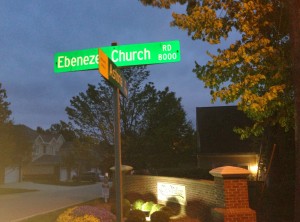A recent lawsuit filed by the City of Raleigh shows that violating its erosion and sedimentation control ordinance may turn out to be a million-dollar mistake.
In 2005, real estate developer IS Partners applied for and was granted a land disturbance permit for a piece of property it owned. In 2012, the city found the land on Ebenezer Church Road violated erosion control rules and began fining the developer $5,000 per day until the issue was resolved. On April 3, 2013, the city filed a lawsuit against the company, seeking a judgment of $1.585 million in unpaid fines.
Yassar Issa, the registered agent for IS Partners, is also named in the suit. Reached by phone Monday afternoon, Issa said he was wholly unaware that a suit had even been filed.
“I’m out of town 30 out of 31 days of the month,” Issa said.
In 2006, he said, IS Partners received a notice regarding an erosion control issue on the land, and said the company worked to fix the issue immediately. Issa said they then sold off the property in parcels to Beazer Homes USA, Inc.
“When Beazer picks up everything, that’s their responsibility,” Issa said.
Rich Ohmann, a division president of Beazer Homes, disagrees with this assertion. When it comes to issues such as storm water and erosion control, he said, the responsibility lies with IS Partners, as they were the one who developed the land.
Beazer is not named in the suit.
“There’s no chance that if we had been notified of something we wouldn’t have snapped right to it,” Ohmann said.
“I know the project very well,” he explained.
“I don’t think I know anything about any lawsuits that have been filed, and we’ve not been notified of anything.”
Beazer Homes has since sold all of the property in Ebenezer Creek to individual homeowners.
Ohmann stressed the importance of making sure that all property his company is involved with stringently adheres to environmental regulations.
“It’s incumbent on you if you’re notified of a violation; it’s not only right from the perspective of avoiding penalties and fines,” he said. “But it’s also right for the environment.”
Addressing Confusion
The address named in the suit, 80009 Ebenezer Church Road, does not exist in the traditional sense. Street signs on Ebenezer Church go from 80000 to 81000. It refers instead to the Ebenezer Creek subdivision, built on land off of Ebenezer Church Road acquired and developed by IS Partners.

Photo by James Borden.
IS Partners originally purchased the 6.83-acre property in May of 2004. In 2007, it split the land into a subdivision, and eventually began selling off individual parcels to Beazer.
Issa said he wound up keeping one of the parcels for personal use, as a result of what he felt was an unfair deal with Beazer.
An Unpleasant Surprise
More than six months ago, Issa said, he met with city lawyers to discus a possible issue with the property. He left the meeting with the understanding that everything had been resolved.
On Monday, he repeatedly expressed his surprise at both the lawsuit and the fact that he had been personally named in it.
He said he would try to not let himself get too worked up over the issue.
“It is what it is. You don’t want to argue with the government,” Issa said.
Michael Williams, Raleigh’s assistant director of public affairs, said the city can not comment on an active lawsuit.
Filing Suit
The lawsuit states that IS Partners is in violation of the city’s erosion control ordinances, specifically §10-511 – failure to follow approved plan. It requires that the developer implement best management practices (BMP) on the site so that a new inspection can be performed. The EPA defines BMPs as “methods that have been determined to be the most effective, practical means of preventing or reducing pollution from nonpoint sources.”
The lawsuit explains that when the city initially recorded the violation, it also put a hold preventing development on the parcel still owned by Issa.
Additionally, it states that nearly all of the registered letters regarding the violations sent to IS Partners were refused and sent back, and that no attempts at appealing the violations were made. Issa said he was unaware of any letters being refused.
According to the lawsuit, the city believes it is “likely to prevail on the merits in this action.”
Richard Whisnant, a professor at the UNC School of Government, said although there are state rules and laws dealing with erosion and sedimentation control, it is often a more local government agency that chooses to implement control – permitting, monitoring and inspection.
“A lot of local governments, in order to mesh better with their development approval process, find it’s better to run that locally than rely on the state to do it,” Whisnant said.
A follow-up call Wednesday to Issa revealed that he has hired a lawyer, and has been advised to not discuss the case any further.
He did want to make one point clear though.
“If this was my responsibility, I would have taken care of it,” Issa said.